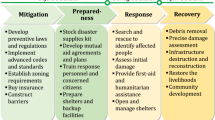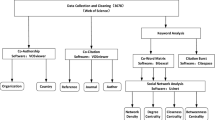Abstract
In this paper, the method based on 2-tuple linguistic is proposed to evaluate the adaptability of the emergency response plan. In this model, dynamic weights are introduced to empress different stages of the emergency. The variables are constructed to measure the correlation between the indexes in the method. Also, the indexes are constructed to evaluate the adaptability of the emergency response plan according to the characteristics of the emergency. For illustration and verification purposes, the case of sudden event from the Longjiang River cadmium pollution of Guangxi province in China is presented. Experimental results obtained demonstrate that the proposed 2-tuple linguistic methodology can improve the evaluation for the adaptability of emergency response plan.

Similar content being viewed by others
References
Cai M (2009) The use of adaptability management in emergency management. Dev Res 8:77–80
Cheng TJ, Wu FP (2013) Research on emergency classification based on improved gray clustering model. ICIC Express Lett Int J Res Surv 11(7):2969–2973
Donner WR (2008) Decision making as community adaptation: a case study of emergency managers in Oklahoma. Disaters 32(2):292–302
Fan ZP, Liu Y, Shen RJ (2012) Risk decision analysis method for emergency response based on prospect theory. Syst Eng Theory Pract 32(5):977–984
Grabisch M (1996) The application of fuzzy integrals in multicriteria decision making. Eur J Oper Res 89(3):445–456
Herrera F, Lopez E, Mendana C et al (2001) Linguistic decision model for personnel management solved with a linguistic objective genetic algorithm. Fuzzy Sets Syst 118(1):47–64
Huang X, Wang SY, Li Q (2014) CFNN model and simulation of adaptation evaluation of emergency material collection network. J Harbin Inst Technol 46(1):52–59
Jiang YP, Fan ZP, Su MM (2011) Study on the dynamic adjusting method for emergency decision. China Manag Sci 19(5):104–109
Ju YB, Wang AH (2012) Emergency alternative evaluation under group decision makers: a method of incorporating DS/AHP with extended TOPSIS. Expert Syst Appl 39(1):1315–1323
Luh PB, Xong B, Chang SC (2008) Group elevator scheduling with advance information for normal and emergency modes. IEEE Trans Autom Sci Eng 5(2):245–258
Mendonca D, Beroggi GE, Gent D et al (2006) Designing gaming simulations for the assessment of group decision support systems in emergency response. Saf Sci 44(6):523–535
Yu L, Lai KK (2011) A distance-based group decision-making methodology for multi-person multi-criteria emergency decision support. Decis Support Syst 51(2):307–315
Acknowledgements
Authors would like to thank the editors and anonymous referees for their valuable comments and suggestions. Their comments helped improve the quality of the paper immensely. The work is supported by the National Natural Science Foundation of China (41271537and 41471457) and the Scientific Research Fund of Nanjing University of Posts and Telecommunication (NYY215005).
Author information
Authors and Affiliations
Corresponding author
Rights and permissions
About this article
Cite this article
Cheng, T., Xu, Q. & Wu, F. Research on the adaptability evaluation model for emergency response plan based on 2-tuple linguistic. Int J Syst Assur Eng Manag 8 (Suppl 2), 954–960 (2017). https://doi.org/10.1007/s13198-016-0552-x
Received:
Revised:
Published:
Issue Date:
DOI: https://doi.org/10.1007/s13198-016-0552-x




